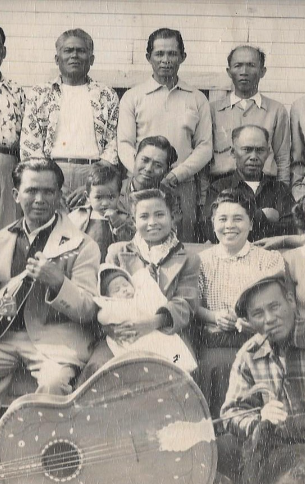
Photo from a labor camp for Filipino farmworkers. The author’s parents are in the center, holding her older brothers.
Mama saw her boss, Jack Radovich, standing in her row during a sweltering San Joaquin afternoon. She was picking table grapes alone when he suddenly appeared, several yards away, gazing off in the direction of the blue-gray Sierra mountains. She assumed he was surveying his vineyards, visiting his farmworkers like he aways did. He was a hardworking landowner, who usually let his young sons build and deliver the packing boxes with a beat-up, sunburnt pickup truck. The kind of boss who always seemed to know when the grape packers needed more boxes. He didn’t call out or turn toward her, but she hurried his way, eager to be the first one from her team to claim the boxes. Daddy was her foreman.
He’d started out as a college student, arriving in Seattle under the Pensionado Act, after the anti-Filipino riots in Yakima, Washington. After earning an accounting degree in 1941, he enlisted in the US Army when the United States entered World War II, to become a US citizen. He fought in a Filipino battalion, where he was made sergeant. Mama was raised in a jungle on Leyte and survived the Japanese occupation. She met Daddy when he was stationed there, and two weeks after V-J Day, they were married, before immigrating permanently to California’s Central Valley. With Daddy’s degree and Mama’s third-grade equivalent education from the Philippines, Jack Radovich was happy to hire them, and they were happy to call him “Boss.” Grateful for the work, Mama always took the time to say hello to him when he was out in the fields.
Mama thought Jack Radovich was a good boss, but she always told me to hide whenever he visited—an urge that still stirs in me with any employer. As a child, the “Boss” was a terrifying figure. Years later, I discovered that my parents weren’t supposed to use their own children as farm hands. The family tradition bent the labor laws but did not break them. My siblings and I picked grapes only during the summer months when school was out.
I was the last one still living at home; my four older brothers and sisters had left town to get a higher education. Mama and Daddy were as old as my friends’ grandparents by the time I became a high school freshman. We all graduated, attended universities, got degrees. Despite never receiving a GED, Mama believed that she had succeeded in life because all her children were college-educated from the money she earned with Daddy, picking and packing table grapes.

Raymund Pacis Barnachea (later Americanized to Raymund P. Barney) and
Lucena L. Barney.
Mama and Daddy spoke Ilocano and English to each other. But Mama also spoke Bisaya, her mother tongue, and Tagalog, the Filipino national language. She became fluent in Spanish while working in the fields. She got along famously with the Latino farmworkers and made Daddy’s job as foreman much easier.
Our parents didn’t teach us their native languages, maybe because they didn’t want us to know what they were always arguing about. Their conflicts mostly revolved around who they should send money home to: Daddy’s landowner upper-class family, who got used to a privileged lifestyle during Marcos’s regime, or Mama’s dirt-poor lower-class family, who lived on the edge of Manila’s biggest trash heap since Marcos’s downfall. After alternating between unintelligible yelling and silent treatments, a compromise was reached: Daddy sent his money to his youngest brother and Mama sent her money to her half-brother.
Those funds were to support his ever-growing family, and to purchase a burial plot for Grandma who had passed away. But Mama soon discovered that her half-brother had only used her money to feed his gambling and womanizing habits. When Mama finally received a 3-month-late notice stating that her mother would be removed from the plot, and that the remains were to be incinerated, our half-uncle was dead to her. She refused to reply to his beseeching messages. He never heard from her again.
I never saw Mama cry over her mother until that day after work. The torn-open letter was on the kitchen table next to her as she prepared celery for potato salad, still dressed in her work clothes. As the chopping noise ceased, she put down the knife and let her face fall into her small, labor-worn hands. I wanted to cry too, but I had forgotten I had a grandmother years before that final notice arrived from the Philippines. Grandma was gone.
After Daddy retired, Mama continued to work, even during dreaded potato and onion season. Her favorite crop was always the table grapes. I thought I hated picking table grapes. I hated waking up during the pre-dawn hours, putting on work clothes that never looked or smelled clean no matter how many times they were washed. But after harvesting potatoes and onions with Mama in the grimy furrows that often stank of rotten tubers or sulfurous bulbs, constantly competing for dirty burlap sacks, running back and forth with heavy, bulging bags with no shelter from the sun, the table grapes became my favorite as well.
Mama was proud to work for Jack Radovich because he produced the finest table grapes. The light green Thompsons Seedless grew as big as my pinkie finger. When ripe, Mama put them in the freezer, and we’d later find them in our halo-halo for dessert. Daddy dried the grapes in our backyard for the largest, golden-brown raisins. They tasted better than cotton candy. After the season ended, we would share whole boxes overflowing with full bunches with family and friends.
When she saw Jack Radovich in the field that day, Mama hurried toward him. “Hello Boss,” she called. “You got us more boxes?” Her muddy work boots sank in the rich, dark soil as she staggered in the middle of the row, then slowed to a stop. He seemed the same distance away no matter how hard she tried to reach him. His boots didn’t get mired in the mud, like hers. The dirt was undisturbed, as if his boots never touched the ground. Squinting, she raised a hand to shade her eyes. His tall figure seemed to undulate slightly in the blinding afternoon sun. He stood too still with his back to her, his profile shadowed under his hat. His unblinking eyes staring upon the repeating rows, acre after acre of his vineyards shimmering in the unrelenting heat of the San Joaquin Valley.
“Hoy!” Mama heard Daddy shout. “The boxes are over here!” She glanced toward Daddy’s voice, small and far away at the end of her row, where the vineyards converged into a single point. When she looked back at Jack Radovich, he was gone.
Teresa B. Wilson-Gunn was born in California’s Central Valley. She grew up working in the fields, mostly picking table grapes. She received a BA from San Diego State University and didn’t start writing about her Filipino heritage until after attending writing workshops with Mary Karr, George Saunders, and Dan Chaon. She lives in Seattle, Washington with her husband and two cats. “The Ghost of Jack Radovich” is her first publication.




